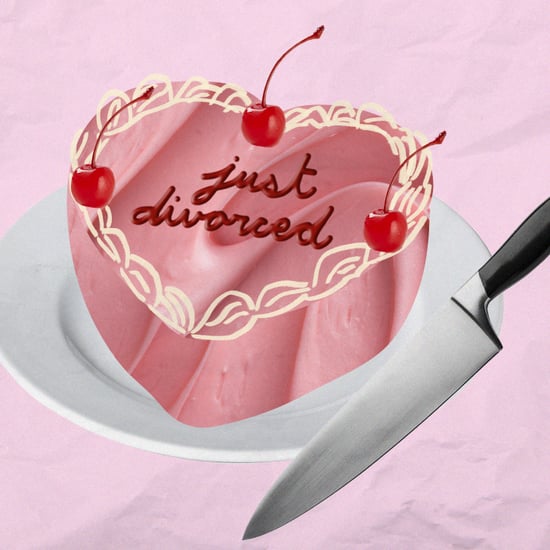6 Ways to Stop Thinking About Someone
What to Do When You Can't Stop Thinking About Someone

If you've ever been unable to stop thinking about someone, you know how accurate the phrase "living in your head rent-free" really is. Try as you might, all roads lead back to that person, often a crush, an ex-partner, an ex-friend, or an annoying coworker or acquaintance. Wondering when you'll see them next; dreaming up future conversations; rehashing and revising past interactions; thinking up reasons to text them; checking and rechecking their social media accounts; finding ways to bring them up in conversations with mutual contacts, whether it's to vent or gush about them — the thoughts can feel all-consuming and exhausting. If you've ever been in this situation, you've likely wanted to know how to stop thinking about someone.
The truth is, there's no single magic strategy for how to stop thinking about your ex when their side of the bed is empty at night, or your ex-BFF when their side of the text convo is a dead end, or that coworker when you're butting heads every week. It takes intentional work — and a little understanding about why that particular person is running circles in your mind.
So, we asked mental health and relationship experts to share why we sometimes can't get someone off our minds, how to know when it's becoming an issue, and how to stop thinking about someone once and for all.
Why You Can't Stop Thinking About That Person
If the person living rent-free in your brain is a crush, attraction is likely playing a role in why you can't stop thinking about them. It feels good to think about the things you admire about someone and to daydream about a future relationship; to some extent, the same holds true for a platonic attraction as well.
But if the person you're preoccupied with is an ex or someone who rejected you, you may be grieving, says Eliza Boquin, MA, LMFT, a licensed relationship and sex therapist. "It's quite typical to go through a grieving process [after a breakup]. You don't necessarily have to be with someone for a long time, but the intensity of how you felt might determine how long it takes to get over that person," she says. If you didn't have a feeling of closure — if someone ghosted you or ended things suddenly, for instance — your thoughts are especially likely to start spiralling. "Our brain works in patterns to make sense of things, and when you don't have a lot of resolution, it can make it really difficult to move on," Boquin says.
Separating from someone you're attached to can even cause symptoms of withdrawal, including difficulty sleeping, eating, and depression, according to a 2019 study. It's a big deal, and it makes sense that it may be hard to get past. But the 2019 research found the more people reported rumination, the harder it was for them to emotionally adjust after a romantic or platonic breakup. The same may hold true for a rejection too.
Anxiety could also factor into why you can't stop thinking about someone, including an ex, an ex-friend, or a crush. People with attachment anxiety, for instance, tend to spent more time ruminating, according to a study in the journal "Personality and Individual Differences", and that can affect relationships other than romantic ones.
When Thinking About Someone Can Become a Problem
It's common to think a lot about a new crush, a recent ex, or even a potential friend or new coworker. Often, these thoughts pass on their own. But generally, if your thinking is bothering you, it's a problem.
Uncontrollable, obsessive thinking can be a red flag for an anxiety disorder or obsessive-compulsive disorder, says Rachel Sussman, LCSW, dating and relationship expert and author of The Breakup Bible. There's even a type of OCD called relationship OCD, which is characterised by thoughts and behaviours relating to a relationship. If you suspect anxiety or OCD is playing a part in your thinking, it's important to see a licensed medical professional for proper diagnosis and treatment.
Even if your symptoms aren't being caused by OCD or anxiety, ruminating about a specific person often goes hand-in-hand with self-blame — such as blaming a relationship ending solely on yourself — which could impact your self-worth, confidence, and even your productivity in your day-to-day life at work or in school, Boquin says. Rumination can also cause you to isolate yourself from other relationships with family and friends, which lets the stubborn thoughts take up even more space in your brain.
Some clear-cut signs that you're thinking about someone too much include: it's been more than six months since the thoughts started; your friends mention being bothered by how much you're mentioning someone; you're having trouble sleeping or eating, or the thoughts are generally getting in the way of your daily life; you're feeling anxious or depressed. "If you find yourself crying a lot and having low energy, it might be a red flag that you need to seek out professional support," Boquin adds. Friends and family can be helpful, but talking to a therapist or counsellor is also often beneficial, she says: "It's important to have a lot of support systems and a lot of different resources to process."
In addition to seeking support from loved ones or professionals, the experts suggest the following strategies for helping to evict someone who's been squatting in your mind.
How to Stop Thinking About Someone
Don't try to stop thinking about someone too soon
You can't forget about a person immediately, especially if you're talking about a breakup. (If you don't know why trying to erase your memories ASAP is a bad idea, consider watching "Eternal Sunshine of the Spotless Mind".) First, "make sure you've talked through the breakup with a good friend or someone who's been through a breakup, or a professional to help you process," Sussman says. The same goes for other situations, including being rejected by a crush, having a friendship end, or having a frustrating interaction with a coworker. While you're in that processing stage, surround yourself with healthy coping tools: exercise, spending time with friends, and getting enough sleep, Sussman suggests.
Notice your thoughts and honour what they're bringing up
If you're past that early stage and still having trouble getting that person off your mind, don't just try to suppress the thoughts. Instead, take the time to embrace and identify your emotions around the person every time a thought about them pops up, says Boquin. Do you feel guilt? Anger? Sadness? Confusion? "The reason acknowledging our emotions works is because this is how we process our emotions," according to Boquin. The more you try to push away what you're really feeling, the more difficult it is to release those emotions (and you may cause emotional blockages in other relationships with loved ones in the process), which is part of letting go, she says.
Reframe your thoughts
After noticing your thoughts and labelling your emotions, give yourself a positive affirmation, such as: "I'm doing the best I can," "This is really hard," or "This is temporary, and at some point I will move through this," Boquin suggests. If self-blame is a recurring loop in your head, consider telling yourself, "I did the best I could in the moment," she says. Also try shifting your thinking toward the future, and what you've learned that you'll bring into your next relationship, such as communicating more clearly.
Block, block, block the person
Across the board, the experts agree that you need to cut off all forms of contact with the person you can't get off your mind, so you can minimise your chances of Insta/Tiktok/Facebook/Twitter/Reddit/BeReal trailing them. Checking in on someone's socials will only allow the obsessive thoughts to continue (that's just science). This step is especially important if you're trying to stop thinking about an ex who's moved on more quickly than you. "Looking them up will only exacerbate the anxiety," Sussman says. Going zero contact is about learning what life is like without that person, Boquin adds.
Ground yourself in reality
When the person does pop into your head, rather than following the same old path of thoughts — whether that's being regretful over a relationship ending, being wistful about what never was, being angry about an altercation, or something else entirely — try to consider a more balanced view of the person. If that person is an ex, for example, remind yourself of their flaws, Boquin suggests. If it was a crush who rejected you (directly or indirectly), reassure yourself that their taste in partners was a mismatch — it can be hard not to take that personally, but the person who's meant for you will be passionate about you, not lukewarm. In some cases, the balanced view might include some positives about the person in question: if you can't stop thinking about a coworker who gets under your skin, it may be helpful to remind yourself of the value they bring to your company or a time they helped you, for instance.
Celebrate your mini wins
Got through half a day without thinking about them? Hey, good for you — celebrate that and keep the momentum going, Sussman says. Also, as your mood and confidence lifts and you become more comfortable taking care of yourself again, consider making it a priority to meet new people. That might mean dating again, or just getting back into socialising, she says. As you meet new faces and reconnect with old friends, you'll have less mental space to spend on that person — and more of your thoughts will go toward people and things that lift you up, instead.







